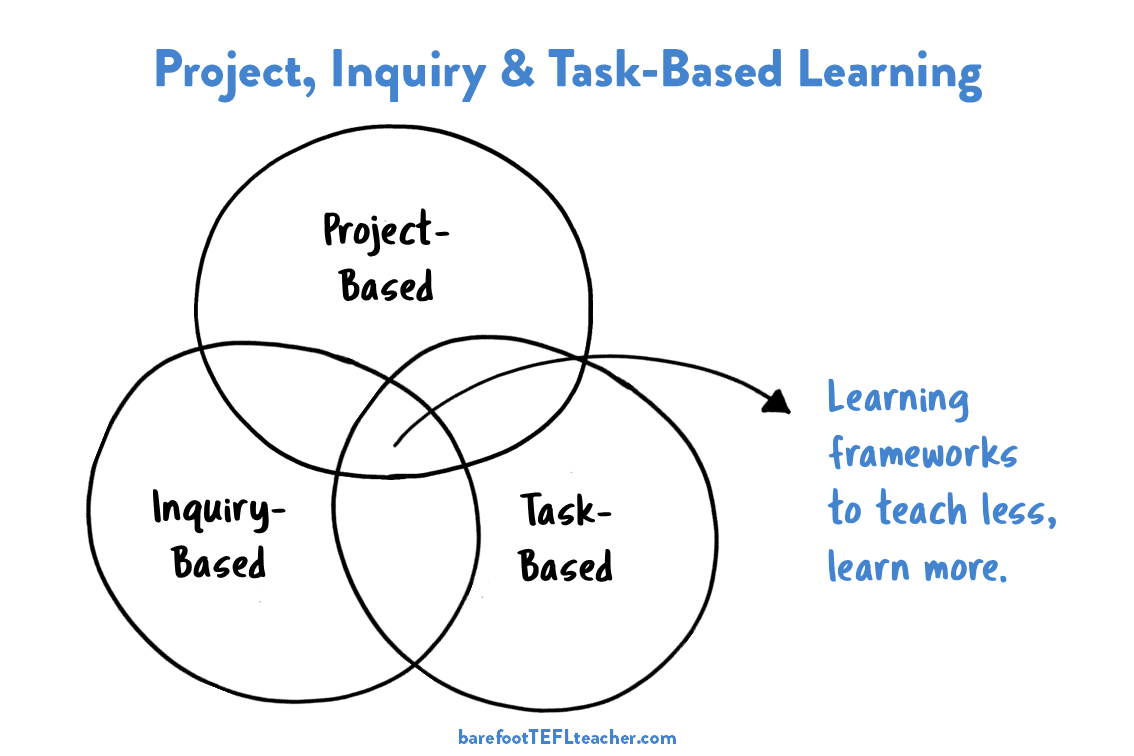Project-, Inquiry-, & Task-Based Learning
What's the difference, and which framework should you use?
Heard of PBL, IBL or TBL but still not sure which one is right for your lesson? You’re not alone. These approaches pop up in training sessions, articles and workshops, often surrounded by academic jargon and diagrams with more arrows than a Game of Thrones battle plan.
Let’s cut through the noise.
In this article, I’ll walk you through what each framework actually is, show you what it looks like in a real TEFL classroom, and give you a simple way to help you pick the right one for your next lesson.
No fluff. Just practical advice.
So what are they?
Let’s start with simple definitions.
Project-Based Learning (PBL)
Students create something meaningful over time, like a website, video, magazine, podcast, that ties together language skills, research, and creativity.
Inquiry-Based Learning (IBL)
Students explore big questions (“Why do people travel?” / “What makes a good leader?”) and use research, discussion and reflection to build their own understanding.
Task-Based Learning (TBL)
Students complete a practical task using language as the tool. The goal isn’t to learn grammar rules - it’s to plan a trip, give advice, solve a problem, or order a meal.
All three are learner-centred. But they serve different purposes.
What this looks like in class
Let’s say you’re doing a unit on travel. Here’s how each method could play out:
Project-Based Learning
Scenario: Students design a travel website or magazine for tourists visiting their country.
Duration: 2–3 weeks.
Activities: Research destinations, interview locals, write articles, design layout, rehearse presentations.
Language focus: Functional language, writing for an audience, collaboration phrases.
It’s messy, creative, and hugely motivating — especially for teens and adults.
Inquiry-Based Learning
Scenario: Students explore the question: Why do people travel?
Duration: 2–4 lessons.
Activities: Watch videos, read short texts, gather opinions, compare cultures, reflect.
Language focus: Expressing opinions, making comparisons, discussing motivations.
Ideal for advanced learners who enjoy discussion and critical thinking.
Task-Based Learning
Scenario: Plan a weekend city break for two people with a £200 budget.
Duration: One lesson (60 mins or so).
Activities: Brainstorm, research transport/accommodation, negotiate decisions, present plans.
Language focus: Making suggestions, agreeing/disagreeing, budgeting language.
Perfect for intermediate learners needing real-world practice.
So… which one should you use?
Here’s how to decide:
Ask Yourself…Best OptionDo I want them to create something over time?Project-Based (PBL)Do I want them to explore a big question?Inquiry-Based (IBL)Do I want them to do something practical today using English?Task-Based (TBL)
Ways to choose
Time
1-2 lessons? → Go for TBL
2-5 lessons? → Try IBL
A whole unit or multi-week topic? → Use PBL
Outcome
Want a real-world product? → PBL
Want an open-ended question? → IBL
Want a practical outcome? → TBL
Student level
Beginner to Pre-intermediate: TBL is your best friend. Clear goals, lots of speaking, simple setup.
Intermediate to advanced: All three can work — let your topic, time and learner preferences guide you.
Mixed-level classes? Blend approaches. A TBL lesson can kick off a mini PBL project. An IBL question can turn into a writing assignment.
Final thoughts
Don’t overthink it.
These aren’t rival gangs. They’re tools. Pick one based on what you want students to achieve. Or mix and match. A good class often includes a little bit of all three.
If in doubt, start with Task-Based Learning. It’s structured, accessible, and delivers fast wins.
And remember - your instincts as a teacher matter more than any label.
Good luck!
If you liked this article, you’ll love my books:
📝 Lesson Planning for Language Teachers - Plan better, faster, and stress-free.
👩🎓 Essential Classroom Management - Develop calm students and a classroom full of learning.
🏰 Storytelling for Language Teachers - Use the power of storytelling to transform your lessons.
🤖 ChatGPT for Language Teacher 2025 - A collection of AI prompts and techniques to work better, faster.
💭 Reflective Teaching Practice Journal - Improve your teaching in five minutes daily.



